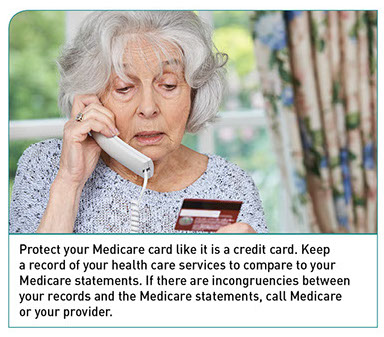
Articles in this section of the newsletter include newsworthy topics related to healthcare in retirement. They aim to keep our clients up-to-date about current events so you have the information you need to Be informed when making decisions.
Preventing
MEDICARE FRAUD
 Medicare fraud costs the program millions of dollars each month and results in higher health care costs for everyone. Often fraudulent claims are made against seniors’ Medicare accounts without them knowing about it. There are a few things you can do to help fight Medicare fraud.
Medicare fraud costs the program millions of dollars each month and results in higher health care costs for everyone. Often fraudulent claims are made against seniors’ Medicare accounts without them knowing about it. There are a few things you can do to help fight Medicare fraud.
When you get health care services, record the dates on a calendar and save the receipts and statements you get from providers. Compare the dates and services on your calendar with the statements you get from Medicare to check for mistakes. If you find items listed in your claims that you do not have a record of, it is possible that you or Medicare may have been billed for services or items you did not get. If you think a charge is incorrect and you know the provider, you may want to call their office to ask about it. The person you speak to may help you better understand the services or supplies you received. Or, your provider may realize a billing error was made.
Here are some additional items Medicare recommends to help reduce fraud.
- Do protect your Medicare and Social Security Numbers. Treat your Medicare card like it is a credit card.
- Do remember that nothing is ever "free." Do not accept offers of money or gifts for free medical care.
- Do ask questions. You have a right to know everything about your medical care including the costs billed to Medicare.
- Do educate yourself about Medicare. Know your rights and know what a provider can and cannot bill to Medicare.
- Do be wary of providers who tell you that the item or service is not usually covered, but they "know how to bill Medicare" so Medicare will pay.
- If you suspect that Medicare is being charged for health care you did not get, or you do not know the provider on the claim, you can call 1-800-MEDICARE (1-800-633-4227).
We at American Republic Insurance Services want to make sure you are informed about Medicare fraud so you feel secure.
Resources
medicare.gov/forms-help-and-resources/report-fraud-and-abuse/fraud-and-abuse
UNDERSTANDING MEDICARE'S BENEFIT PERIOD - April 2017
UNDERSTANDING
MEDICARE'S BENEFIT PERIOD
 Understanding the costs associated with Original Medicare can be confusing. One common topic our clients ask about is the benefit period. According to Medicare, the benefit period is how it measures your use of hospital and skilled nursing facility (SNF) services. A benefit period begins the day you are admitted as an inpatient in a hospital or SNF. The benefit period ends when you have not received any inpatient hospital care (or skilled care in a SNF) for 60 days in a row. If you go into a hospital or a SNF after one benefit period has ended, a new benefit period begins. You must pay the inpatient hospital deductible for each benefit period. There is no limit to the number of benefit periods.
Understanding the costs associated with Original Medicare can be confusing. One common topic our clients ask about is the benefit period. According to Medicare, the benefit period is how it measures your use of hospital and skilled nursing facility (SNF) services. A benefit period begins the day you are admitted as an inpatient in a hospital or SNF. The benefit period ends when you have not received any inpatient hospital care (or skilled care in a SNF) for 60 days in a row. If you go into a hospital or a SNF after one benefit period has ended, a new benefit period begins. You must pay the inpatient hospital deductible for each benefit period. There is no limit to the number of benefit periods.Benefit periods determine how much you pay for your inpatient hospital or SNF stay. You must meet your Part A deductible at the beginning of each benefit period as well as pay a daily coinsurance depending on how many days you stay at the hospital or SNF during one benefit period.
In 2017, Original Medicare Part A costs for hospital and SNF stays are:
• $1,316 deductible for each benefit period
• Days 1–60: $0 hospital coinsurance for each benefit period
• Days 61–90: $329 hospital coinsurance
• Days 91 and beyond: $658 coinsurance per "lifetime reserve day" after day 90 for each benefit period
(up to 60 days over your lifetime)• Beyond lifetime reserve days: all costs
• Skilled nursing facility coinsurance: $0 for the first 20 days of inpatient care each benefit period; $164.50 per day for days 21-100
For example, you enter the hospital as an inpatient on July 1st and then go home on July 15th (14 days in the hospital). You need to go back to the hospital on August 31st (47 days out of the hospital) for 2 days. You are still in the same benefit period because you have not spent more than 60 days out of the hospital or SNF. You will not have to pay another hospital deductible and since you will be on days 15-17 of your hospital benefit, you will not have to pay any coinsurance either.
SHOW THAT SENIOR SMILE - January 2017
Show that
SENIOR SMILE
The old saying “if you look good then you feel good” can often be applied to your smile. The mouth is the gateway to overall good health and poor oral hygiene has been linked to several health issues. Recent studies have linked various dental care issues like periodontal disease to strokes, diabetes, respiratory disease, heart disease and more. Despite being preventable, periodontal disease and tooth decay are the leading causes of tooth loss in seniors. That is significant, because research has shown that seniors who have such coverage are far more likely to go to the dentist.
 Original Medicare (Part A and Part B) does not cover most dental care such as:
Original Medicare (Part A and Part B) does not cover most dental care such as:• Dental exams
• Routine cleanings
• Fillings
• Tooth extractions
• Dentures and dental implants
Medicare Part A (Hospital Insurance) will pay for certain dental services that you receive when you are in a hospital. If needed, Part A can pay for emergency dental procedures, even though the dental care is not covered. For example, it you suffer an accident that results in damage to the jaw, Medicare may cover the medical reconstruction of the jaw. Or if you have a disease involving the jaw, Original Medicare might cover a tooth extraction that is directly caused by the disease.
Fortunately, there are dental insurance options for seniors. These Dental Plans offer senior citizens a hassle-free way to save money at the dentist and help protect their dental health. Often these plans are guarantee issue and have an option to add vision and hearing coverage. Contact your American Republic Insurance Services agent for information on dental plans you may be eligible for.
HOME HEALTH CARE - October 2016
HOME HEALTH CARE
As people enjoy their golden years in retirement some may experience an unexpected illness or accident. There are times when the recovery will be required or preferred to be administered at home. However, many people have misconceptions as to when or if Medicare covers home health care.
If you have Medicare Part A (Hospital Insurance) and Medicare Part B (Medical Insurance), Medicare will cover certain health care services in your home if you meet certain eligibility requirements as follows.
1. You must be under the care of a doctor and the doctor has established a plan of care, which is reviewed regularly.
2. The doctor must certify that you need one or more of the following;
a. Intermittent skilled nursing care
b. Physical therapy
c. Speech-language pathology services
d. Continued occupational therapy
3. The doctor must certify that you are homebound. This is generally met if non-medical absences from your home are infrequent
and leaving home requires a considerable effort.4. You need skilled nursing care on an intermittent basis which is less than 7 days per week , or less than 8 hours each day over a
period of 21 days.5. The home healthcare agency must be a Medicare–certified provider.
 Usually, a home health care agency coordinates the services your doctor orders for you. The home health agency should tell you how much Medicare will pay and the cost of any items that are not covered.
Usually, a home health care agency coordinates the services your doctor orders for you. The home health agency should tell you how much Medicare will pay and the cost of any items that are not covered.Medicare pays for your covered home health services for as long as you are eligible and your doctor certifies you need them. If you need more than part-time or “intermittent” skilled nursing care, you are not eligible for the home health benefit.
It is important to know what Medicare will not cover. The following are a few examples that are the person’s responsibility to cover:
• 24-hour-a-day care at home
• Meals delivered to your home
• Homemaker services like shopping, cleaning, and laundry when this is the
only care you need, and when these services are not related to your plan
of care.
• Personal care given by home health aides like bathing, dressing, and using
the bathroom when this is the only care you need.
Knowing when Medicare covers home health care is important. Even with Medicare coverage, there may be expenses that you could be responsible for covering. Contact your American Republic Insurance Services representative for more information on home health care including the possibility of additional home health care coverage.
OUR VALUED CUSTOMERS ON NATIONAL SENIOR CITIZENS DAY - July 2016
RECOGNIZING OUR VALUED CUSTOMERS ON
NATIONAL SENIOR CITIZENS DAY
 National Senior Citizens Day recognizes contributions senior citizens make in communities across the United States. It is annually observed on August 21. Various events and activities are organized on Senior Citizens Day to raise awareness of supporting older people and recognizing their achievements both past and present. Some people raise awareness through social media and news stories, while others organize special community gatherings inviting senior citizens, their families, friends and volunteers. Some businesses give special discounts or deals to senior citizens on or around August 21.
National Senior Citizens Day recognizes contributions senior citizens make in communities across the United States. It is annually observed on August 21. Various events and activities are organized on Senior Citizens Day to raise awareness of supporting older people and recognizing their achievements both past and present. Some people raise awareness through social media and news stories, while others organize special community gatherings inviting senior citizens, their families, friends and volunteers. Some businesses give special discounts or deals to senior citizens on or around August 21.History of National Senior Citizens Day:
Some people celebrate Senior Citizens Day on August 14 as it was the day past US president Franklin Roosevelt signed the Social Security Act in 1935. However, in 1988 Ronald Reagan, who was the US president at the time, declared August 21 to be National Senior Citizens Day.
 This observance was established in honor of senior citizens in the US who made positive contributions in their communities. The day was also created to bring awareness of social, health, and economic issues that affect senior citizens.1
This observance was established in honor of senior citizens in the US who made positive contributions in their communities. The day was also created to bring awareness of social, health, and economic issues that affect senior citizens.1We at American Republic Insurance Services wish you, our valued customer, a happy National Senior Citizens Day. We want to say thank you for all your support and appreciate all you have done. We recognize your achievements, both past and present and the contributions you make to our communities. Thank You!
OSTEOPEROSIS EARLY DETECTION IS KEY - April 2016
OSTEOPEROSIS
EARLY DETECTION IS KEY
May is National Osteoporosis Month. Osteoporosis (low bone density) is a disease in which your bones become weak and brittle, so brittle that even mild stresses can cause fractures. The Centers for Medicare and Medicaid Services (CMS) reports that 44 million Americans suffer from osteoporosis or porous bones. People do not actually feel their bones getting weaker, so you may not know that you have osteoporosis until you break a bone. Osteoporosis affects men and women of all races but 68% percent of the at-risk population are women. Of those who are at risk for osteoporosis, 50% of women and 25% percent of men over age 50 will suffer one of the estimated 1.5 million fractures per year. You may be at higher risk for osteoporosis if you are:
 How can it be detected? Detecting osteoporosis at an early stage, when treatment works best is important. Treating low bone mass early can help prevent broken bones in the future. If you or a loved one is at risk you should ask your doctor about a Bone Mass (Density) measurement. Your bone mass can be measured by using low levels of X-rays to determine the proportion of mineral in your bones. In most cases, only a few bones are checked - usually the hip, the wrist and the spine. Medicare Part B (Medical Insurance) covers this test once every 24 months (more often if medically necessary) for people who meet the criteria below. You pay nothing for this test if the doctor or other qualified health care provider accepts assignment.
How can it be detected? Detecting osteoporosis at an early stage, when treatment works best is important. Treating low bone mass early can help prevent broken bones in the future. If you or a loved one is at risk you should ask your doctor about a Bone Mass (Density) measurement. Your bone mass can be measured by using low levels of X-rays to determine the proportion of mineral in your bones. In most cases, only a few bones are checked - usually the hip, the wrist and the spine. Medicare Part B (Medical Insurance) covers this test once every 24 months (more often if medically necessary) for people who meet the criteria below. You pay nothing for this test if the doctor or other qualified health care provider accepts assignment. • A woman whose doctor determines she is estrogen deficient and at risk for osteoporosis,
• A woman whose doctor determines she is estrogen deficient and at risk for osteoporosis,
based on her medical history and other findings• A person whose X-rays show possible osteoporosis or vertebral fractures
• A person taking prednisone or steroid-type drugs or is planning to begin this treatment
• A person who has been diagnosed with primary hyperparathyroidism
• A person who is being monitored to see if their osteoporosis drug therapy is working
To learn more about Medicare’s coverage of Bone mass measurement or other preventive services visit Medicare.gov.
• Older than 50
• Small in body size
• A post-menopausal woman
• White or Asian descent
The earlier osteoporosis can be detected, the more effective the treatment as you age. Treatments range from changing your diet to injections by a certified medical professional.
• Eat a diet low in calcium
• Not physically active
Food rich in calcium and vitamin D help prevent the disease Osteoporosis. Make sure you get enough calcium and vitamin D in your daily diet to help maintain bone density.
© 2017 American Republic Insurance Services, LLC.
® “American Republic Insurance Services”, “Be Informed. Be Smart. Be Secure.”, and the eagle logo are registered service marks of American Republic Insurance Services, LLC.





